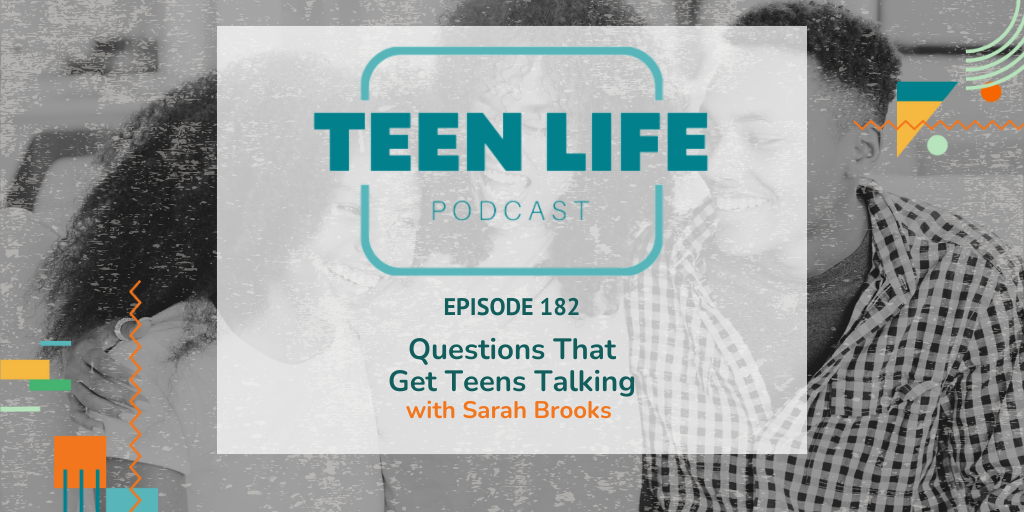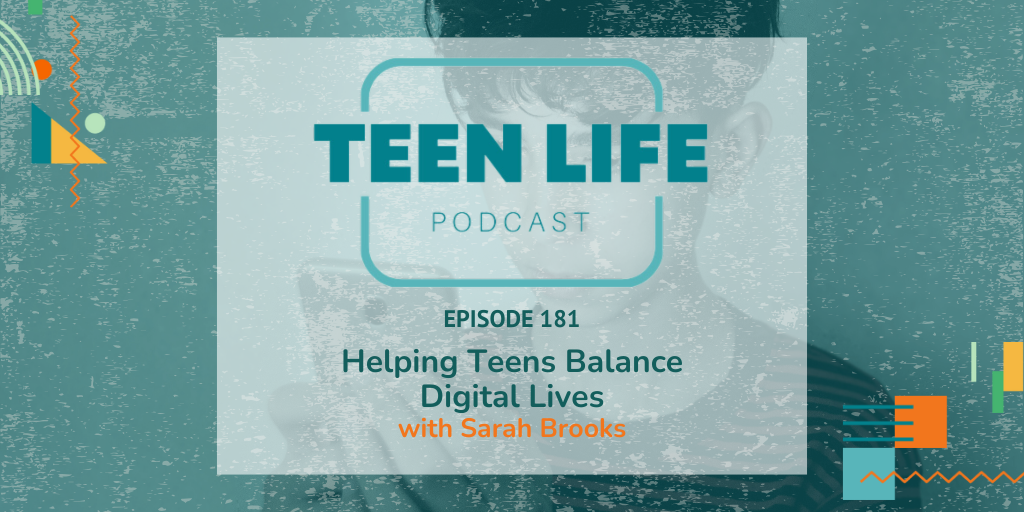Podcast: Play in new window | Download
How to Get Past “Fine”: Sparking Real Conversations with Teens
“How was your day?”
“Fine.”
Sound familiar? Sarah Brooks joins the team to share practical ways adults can move past one-word answers and open the door to meaningful conversations with teenagers.
Key Question
I ask my teen how their day was and all I get is ‘fine.’ How can I get them to give me more than one-word answers?
Why Teens Give Short Answers
Short replies like “fine,” “good,” or “nothing” often have less to do with rudeness and more to do with what’s happening beneath the surface. After a long day of classes, social interactions, and activities, teens are usually tired and may need time to decompress before they can switch into conversation mode.
Many teens also guard their independence. A quick answer can be their way of keeping a sense of privacy or control, especially if they feel peppered with questions. Add in the natural push for autonomy during adolescence and the ever-present distraction of phones, and it’s easy to see why they might default to the simplest response.
The way questions are asked matters too. Broad, open-ended prompts like “How was school?” can feel overwhelming because they require a teen to sift through an entire day’s worth of experiences. Specific, concrete questions—“Who made you laugh today?” or “What class surprised you?”—are easier to answer and invite a real exchange.
Environment and timing also play a big role. Teens may clam up if they feel like they’re under a spotlight or being interrogated. They tend to talk more freely when the setting is low-pressure, such as during a car ride, while cooking, or on a walk, when conversation can flow side-by-side instead of face-to-face.
Better Questions, Better Connection
Listen to the full episode for lots of great conversation starters, but here are a few to try right away:
- “Who’s the funniest person you saw today?”
- “What would your friends say about this?”
- “What do you wish adults understood about your generation?”
These focused prompts give teens something specific to answer and invite them to share their real thoughts.
Listen First, Fix Later
The most powerful tool isn’t the perfect question—it’s how you listen.
Here are our top tips:
- Stay unflappable. Don’t react with shock or judgment.
- Resist the urge to fix. Teens need space to process, not a lecture.
- Be present. Put the phone down, make eye contact, or go for a walk or drive to create a relaxed side-by-side setting.
Timing Matters
The moment you choose to start a conversation can determine whether it blossoms or fizzles.
After school, practice, or a social outing, many teens experience a mental “crash” as they transition from the demands of the day to the safety of home. They need what some call a “decompression zone”—a stretch of time to grab a snack, scroll their phone, or simply be quiet before they’re ready to share.
It’s also important to read the room.
If a teen is clearly tired, irritated, or focused on another task, even well-intentioned questions can feel intrusive.
Look for natural pauses instead. A short car ride, a walk with the dog, or a shared chore like washing dishes often creates the relaxed environment that invites conversation. Side-by-side settings lower the pressure and make it easier for teens to open up, because they’re not under the direct gaze of an adult.
Adjusting to a teen’s internal clock can help too.
Some are more talkative late at night, others early in the morning, and many need their own rhythm respected. Rather than demanding immediate answers, letting them know you’re available when they’re ready shows trust and patience.
Key Take-Aways for Parents Teachers and Mentors
-
Build trust early with everyday connection points, not just big “serious talks.”
-
Admit when you miss the mark—owning mistakes shows respect and models humility.
-
Offer choices about when and how to have important conversations.
Some Last Thoughts
Getting past one-word answers isn’t about pushing harder—it’s about creating space.
When caring adults give teens time to unwind, ask thoughtful questions, and listen without judgment, they signal respect for the teen’s world. Over time, those small, consistent choices build the kind of trust that turns everyday moments into meaningful conversations and lasting connection.
Read Episode Transcript
Host:
I ask my team how their day was and all I get is “fine.” How can I get them to give me more than one-word answers? That’s the question today, and we brought in an expert. Caleb isn’t here, but we’re upgrading—sorry, Caleb—with Sarah Brooks.
Sarah is a Teen Life board member, volunteer, super-mom, and a champion of teenagers. She has a gift for making teens feel safe, heard, and willing to talk, which is why we wanted her insight.
Sarah Brooks:
Thanks for having me! I think adults get stuck with one-word answers for a lot of reasons. Teens might simply be uninterested in that moment. Maybe they need a snack, maybe their mind is still on school, or maybe it’s just not the right time. It usually isn’t personal.
Also, if you ask a lame question, you’ll get a lame answer. “How was your day?” is a front-door question—it’s direct and flat. If you rephrase creatively and come in the “back door,” you’ll get fuller answers.
Host:
So give options instead of yes/no?
Sarah:
Exactly. If you ask a yes/no question, they can brush it off. Give them choices so they have to think. Teens also hate looking foolish in front of peers, so I often ask about their friends: “What would your friends say about…?” or “What do you think your generation thinks about…?” They’re really giving their own opinion without the pressure.
Kids also love giving advice. Ask, “If you were parenting right now, what would you do?” They’ll reveal a lot without realizing it.
Host:
Sometimes you need to warm them up first.
Sarah:
Yes. You can’t start with a heavy question. Read the room and build up. And never nag—“Tell me more” after a “fine” is the quickest way to shut them down. I compare it to approaching a wild animal: you can’t come in aggressive. Even parents need to give space.
Host:
What about timing?
Sarah:
Timing and setting are huge. Think about a “decompression zone.” When someone comes home, give them a pause before starting a conversation. Side-by-side is powerful—talk while driving, walking, planting flowers, even coloring. Facing each other can feel intense. Moving together lowers defenses and even gives you a second to hide a surprised reaction.
Host:
Great tip. What questions actually open the door?
Sarah:
I like to ask my kids for a “parenting evaluation”:
“What am I doing well?”
“What could I improve?”
It tells them we’re all learning. I’ll ask, “Which of your friends could use more or less parenting—and why?” Or fun ones:
“Who’s the funniest person you know?”
“Who’s the meanest?”
“What do you wish adults understood about your generation or the struggles you face online?”
Specific questions work better than “How was your day?”—which part of an eight-hour day do they even pick?
Host:
Listening is key too.
Sarah:
Absolutely. You can have the best questions in the world, but if you’re not a safe listener, it won’t matter. Listen curiously, be unflappable, and don’t take answers personally. And don’t rush to fix things. If a teen shares a problem, your job in that moment is to hear them, not solve it.
Host:
Sometimes we relate everything back to our own stories.
Sarah:
Right. Let them have their own experiences. Even if their situation mirrors yours, you don’t need to make it about you.
Host:
What if you must have a tough conversation?
Sarah:
Set expectations. Say, “We need to talk about something hard—would you rather do that now or later?” Give them a choice when possible. Make sure everyone is fed and rested; it matters more than we think.
Host:
Any last advice?
Sarah:
Admit when you mess up. If you lose your temper or don’t listen, own it and ask for a redo. That builds trust. And remember, small moments of connection add up—late-night talks, car rides, walks, helping with a task. Those everyday touchpoints pave the way for the deeper conversations.
Host:
Such good wisdom. This week, look for an intentional way to connect with a teen—maybe a drive, a walk, or just a silly question. Subscribe to the podcast and join us next time.

Karlie Duke
Communications Director

Tobin Hodges
Program Director

Sarah Brooks
Special Guest
Karlie Duke | Director of Communications
Karlie has always had a heart for teenagers. Through her role at Teen Life, she loves to showcase the amazing stories coming out of Support Groups, but she is especially passionate about helping adults and teenagers find connection. Karlie has a BS in Communications with a minor in Family Studies from Abilene Christian University.
Tobin Hodges | Program Director
Tobin’s entire career has been centered around students and teens from all walks of life. He has a passion for helping teens be their best selves. As Program Director, he loves working directly with school staff and students through Teen Life Support Groups. Tobin has a Bachelor’s Degree in Music from Texas Tech University.
Sarah Brooks | Author and Speaker
Sarah Brooks is a blogger, mom of 3 boys and social media expert! She has spoken across the country at various groups, churches, and schools about social media (the good, the bad, and the confusing), most of which stemmed from a post she wrote called Parents: A Word About Instagram. As a Millenial herself, she is passionate about bridging the gap between parents and teens on all things social media. Follow her on Twitter or Instagram!












